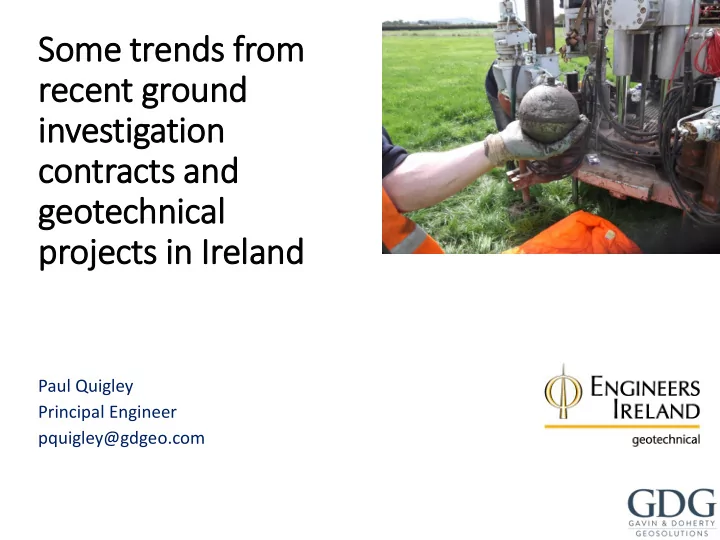

Some trends fr from recent ground in investigation contracts and geotechnical projects in in Ir Ireland Paul Quigley Principal Engineer pquigley@gdgeo.com
This talk will discuss… • Risk and the role of geotechnical engineering • Ground investigation in Ireland • Commercial out-turn from GI contracts • Trends from the data • Some comments and discussion
Previous papers and presentations • Internal paper at Arup (2011) • Quigley, P. (2012) The value of ground investigation in Ireland, BCRI, Dublin. • Quigley et al. (2015) Some trends from recent ground investigation contracts in Ireland, Proc. XVI ECSMGE 2015, Edinburgh. • Quigley et al. (2016) Some trends from recent geotechnical projects in Ireland, Proc. ICE Forensic Engineering, Vol. 169 Issue 3, August 2016, pp. 83-93
Ground related risks IEI (2003 ) From Tim Chapman (2008), ‘The relevance of developer costs in Geotechnical risk management’. BCRI 2012 4
Road construction Clayton, C.I. (2011), ‘Managing Geotechnical Risk – 10 years on’. BCRI 2012 5
Risk management Lazarus & Clifton (2001) Managing project change – a best practice guide, C556, CIRIA, London BCRI 2012 6
Percentage fee scales • Some clients link fees to percentage of the capital costs Scheme Civil Fee scale – detailed Geotech proportion of design overall design fee Buildings 2 – 4% 2 – 10% Roads 3 – 5% 10 – 20% Flood defence 3 – 5% 25 – 70% Ports and harbours 3 – 6% 25 – 70% • This incentivises reducing effort spent on geotechnical engineering in competitive tenders. Some clients do not include geotechnical engineering in quality assessments. • This can result in excessively conservative design to account for the lack of geotechnical engineering input. The works usually take longer to implement which has significant costs. Worse case is that the structure fails to meet performance criteria. 7
Ir Irish ground conditions Glacial landscape Unsorted nature of glacial till • Peat covers 17% of country • Very soft silts adjacent to rivers, estuaries, inter-drumlin areas, etc. Image taken from University of Sheffield
Ground investigations Basement and deep excavations Motorway development 2000 - 2010
Techniques Plus trial pits, geophysics, CPT (infrastructure / civil), dynamic probes…. Numerous contracts: Remeasureable, Lump sum, Public Works Contract, etc.
Authors and assistance fr from:
Before we have a look at the data……. Each project is different and requires an individual assessment. But…………………..
How much of f the tender sum is is paid id out? 1. This is an investigation 2. Rotary core boreholes more expensive than cable percussive 3. Conservative estimates of quantities of RC follow on in glacial till? 4. Conservative estimates of number of tests required 5. Occasionally addition ground investigation is required or delays/overruns occur
When the data is is presented in in a histogram….
Is Is there a trend with project value? € 10K - € 20K, N = 219 € 20K - € 50K, N = 77 >€ 50K, N = 89
Does it it matter who designs the GI? I? Contrib. N = 106 Non contrib. N = 119
How much of f the contract is is based on fi fieldwork?
What proportion of f the construction budget is is spent on GI? I? Building projects Road and Bridge projects
How many explorations on a typical sit ite? Building area Construction cost
Tender award based on price only….. BCRI 2012 20
AGS BDA taskforce in UK The two lines are speculative, subjective, unquantified and unsubstantiated but useful for stimulating debate Start of CPT use in Ireland Restricted budgets and site Geophysics & supervision Geobor S 21
Conclusions and Recommendations • Poor ground investigation and geotechnical design is frequently an issue in project cost and programme overruns. • Early intervention produces greater opportunity to provide developers with certainty and guidance. • Ground investigations frequently cost less than the tender cost. This suggests the presence of a conservative bias when competent geotechnical engineers design ground investigations. • A remeasurable contract is ideally suited for most ground investigations. Please use the Engineers Ireland Specification and Related Documents for Ground Investigation 2 nd Edition 2016 (Green Book)
Conclusions and Recommendations • The proportion of the construction budget spent on ground investigations tends to decrease with increasing project value. • There is a need to record data and improve decision making. The cause of failures or losses on projects would be worthwhile sharing. • Is there a need to introduce quality requirements for Ground Investigation Contractors by the State to promote best practice?
Thanks to:
Recommend
More recommend